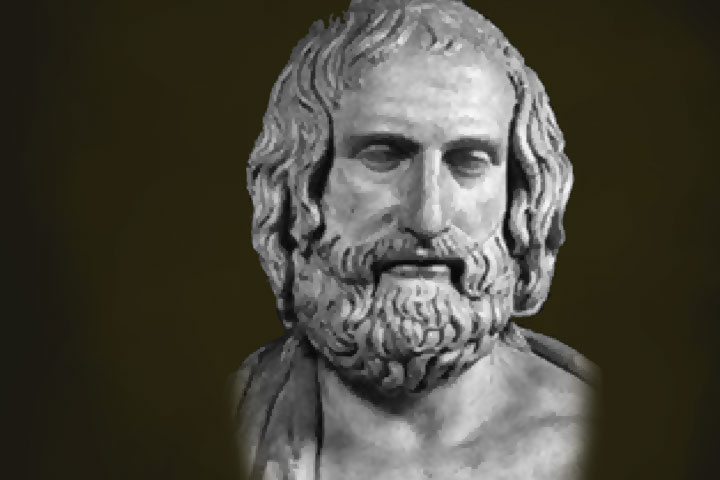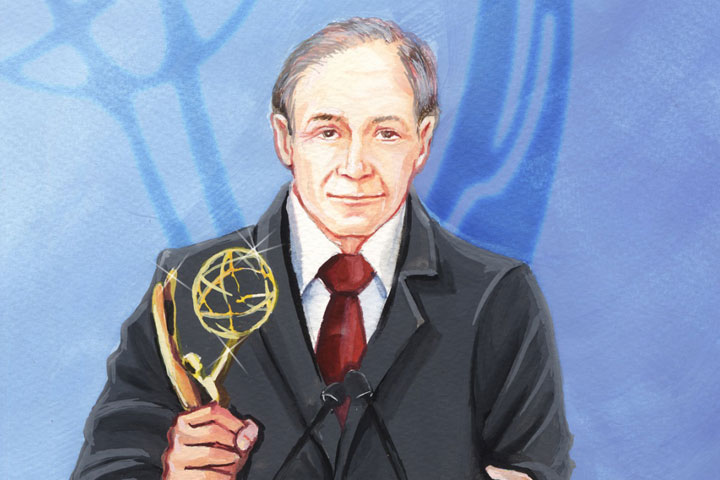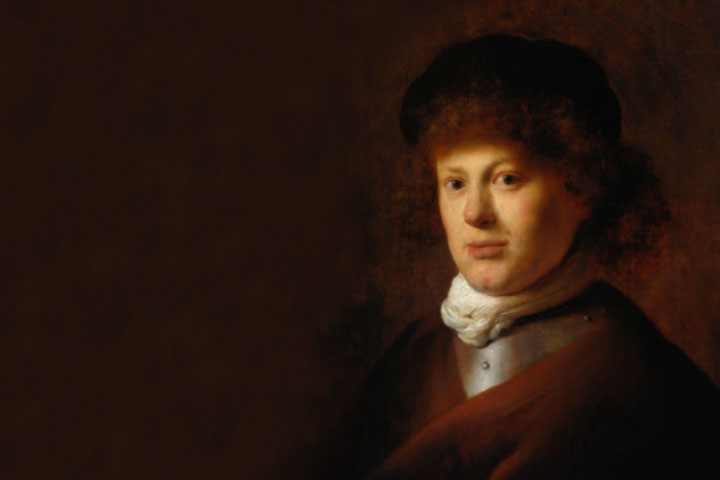
“It is more important to know what sort of person has a disease than to know what sort of disease a person has,” said Hippocrates, renowned to date as the Father of Modern Medicine and as the author of the Hippocratic Oath- taken by physicians worldwide, before entering active practice.
Said by a man who dedicated his entire life to research about human health and medicine, this quote of Hippocrates is a clear indicator that a health of individuals depends upon their unique personalities, which in turn, are defined by thoughts. In layman’s lingo, Hippocrates means, a happy mind results in a healthy body. These Hippocratic words are also the first ever said by any ancient medical practitioner about the importance and use of psychology to prevent or cure physical afflictions.
And to infer thus, Hippocrates needed to have a deep understanding about the correlation between the mind and the body- which he acquired from his young age.

Hippocrates was born in 450BC on the Greek island, Kos. He was the son of a renowned physician, Heraclides, according to the ‘Suda’, a compilation of lexicon by Byzantine scholar Suidas. His mother was named Praxitela. Most records of Hippocrates’ birth and lineage are however ambiguous. However, it is widely accepted that his ancestors were physicians who enjoyed royal patronage due to their fine skills. Hence, Hippocrates, since childhood, was privileged with a wealthy lifestyle.


The young Hippocrates studied at a regular school in native Kos. He studied mathematics, history, religion and music, for about 10 years, as a child. At home, Hippocrates assisted his father Heraclides to attend patients. He comforted patients suffering excruciating pain, ran errands such as fetching herbs, roots and other paraphernalia for his father.
Hippocrates had a compulsive habit of watching butchers in the local market, as they slaughtered animals for meat. He observed them intently, noticing how they skinned the carcass, separated offal and fat and carved the meat. He studied the structure of various body organs and their arrangement in such animals.
Hippocrates avocation towards watching animals being killed and disembowelled was not due to some grotesque fetish: Instead, he wanted an insight into the organs that living creatures possessed and their functions. Hippocrates noticed the differences in anatomies of the animals he had watched being slain and slashed and yearned to know what lay inside the human body and their functions.

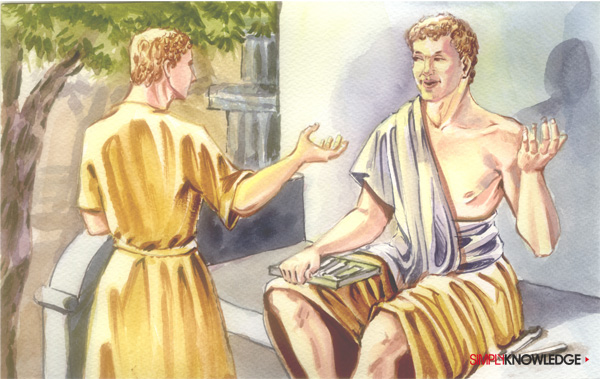
At the age of 15, his father enrolled him into a local school for higher learning, where he studied for two years. Hippocrates was fond of sports and became an aficionado of athletics, mastering it himself and winning several accolades.
Athletic training gave Hippocrates some vital clues about medicine, which would later have immense bearing upon his practice as a physician- forming basis for an advanced branch of psychology. His father, Heraclides, began tutoring the teenaged Hippocrates in diagnosing patients and prescribing appropriate medicines.
He once told his father incisively: “If we could give every individual the right amount of nourishment and exercise, not too little and not too much, we would have found the safest way to health.” This quote, though disregarded at the time, laid basis centuries later for Sports Psychology. It portended the vital link between physical fitness combined with proper nutrition to ensure a robust mental health which lowered the likelihood of a person suffering from physical ailments.
Though improperly documented, Hippocrates is claimed to have travelled to distant lands including Egypt, Libya and India along with his father, Heraclides and another reputed physician of the era, Heradicos, to study medical practices of the Orient.

Relentless training from his father, a voracious desire to learn various aspects of medicine, his gumption and sagacity to try new treatments, often with stupefying success, soon earned Hippocrates a healthy reputation in Athens. Indeed, he soon outshone his father Heraclides, much to the delight of the family.
The success and kudos did not inflate Hippocrates’ ego: Instead, it impelled him to try and improvise on then prevalent medical therapies to offer better, long lasting or permanent cures for patients. He conducted innocuous experiments on patients, again with astounding results. These experiments were rather simple: Hippocrates would first try and understand a person’s mental state before and during the affliction. He discovered individuals who were unhappy or sad for any reason, were more prone to disease. Those who were affluent suffered from ailments because of their sedentary lifestyles and unbridled dietary habits. Hippocrates also tried to wean away the masses from the common superstition that ill health was caused by curses from vague deities due to some sacrilegious act committed by patients. He proved, ill health and superstition are not related. Instead, Hippocrates proclaimed that all diseases- mental or physical- are caused by purely natural conditions.
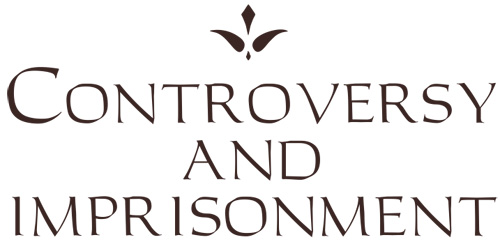
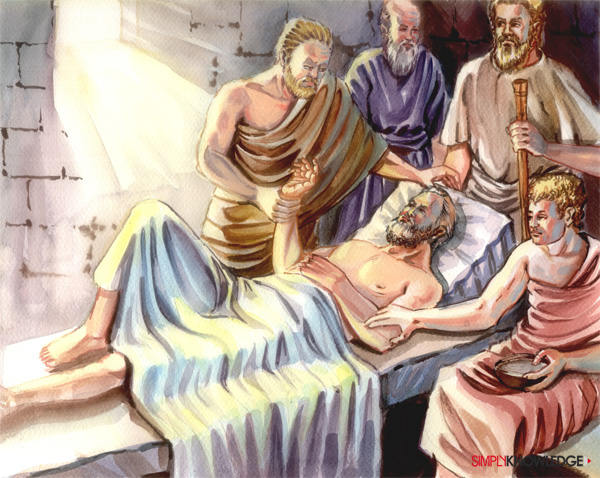
Hippocrates evoked several controversies when he began practicing medicine in unconventional forms: While contemporary physicians treated physical disease as a spiritual affliction or punishment for evil deeds, Hippocrates was the first to expound that all ailments can be traced to natural elements rather than superstitions prevalent at the time. He believed in proper prognosis and diagnosis of patients from the perspective of nature rather than some esoteric incubus.
His methods, which seemed unconventional at the time, form the basis of modern day medical treatment, this earning him the title; “Father of Modern Medicine.” However, his techniques led to attrition with priests and noblemen of the era, leading to his imprisonment for an unspecified period. Hippocrates was quick to utilize this opportunity to further advance his medical studies by empirical research on other prisoners such as observing their behaviour, anatomy, relapse patterns and symptoms, since he was given the privilege of practicing medicine while incarcerated. This privilege was simply because the authorities could not find any better medical practitioner than Hippocrates.

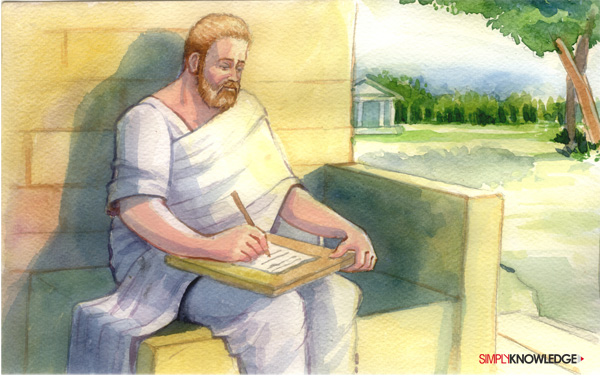
Hippocrates did not waste his time in prison. He made careful notes of everything he learnt while treating patients, including a vital psychological fact that detainees and people lacking freedom, suffer from mental problems rendering them susceptible to disease. The squalid conditions in jail and sullied robes of prisoners also played a contributory role in spreading contagion, he found.
But above all, Hippocrates’s childhood dream, albeit morbid, fructified while he was incarcerated. He became the first known person to dissect a human cadaver to study the anatomy and find reasons for existence of various organs - in flagrant violation of the prevailing religious norms. He is also credited with authoring his first book on medicine: ‘The Complex Human Anatomy’, in which he first propounded the theory that complete knowledge of the human body was vital for any medical practitioner before diagnosing and treating an ailment.

Upon release from prison, Hippocrates is credited with travelling to various parts of the Hellenic empire to teach medicine, finding several followers who further honed his medical practices and critiques whose remarks helped understand mistakes and errors in his techniques. He was appointed as the ‘Royal Physician’ to the court of the king of Macedonia, who put a small band at Hippocrates’ disposal to fetch various substances for experimentation.
Hippocrates had earned a unique distinction: He had proved his methods of prognosis and diagnosis and begrimed the very superstitions for whose violations he was jailed. His accusers found themselves smirched by his achievements, as their fallacies were proven beyond any reasonable doubt: That illnesses have natural causes- physical and mental. He conclusively debunked the claim that ailments are caused by some Diablo.

Having discredited all superstitions, Hippocrates progressed his theories further: He is the first recorded physician who abhorred prescribing medicines to patients. Instead, Hippocrates believed that medication should be eliminated altogether or administered in the lowest possible dose. He expounded, most disease can be treated by altering the overall lifestyle of any individual, and, the human body is capable of healing itself through exercise and nutrients found in food.
Hippocrates continued to study, teach and write medicine till his ripe old age. He followed a healthy lifestyle, in conformity with his teachings. Hippocrates preached the well being of a patient depends upon the sensitivity displayed by a physician. Meaning, a physician must first understand the agony of a patient and its extenuating causes, to chart an effective therapeutic regimen. He authored several extant texts and the globally acclaimed ‘Hippocratic Oath’ for physicians who wish to actively practice medicine.

Hippocrates died of old age, around 370BC. He maintained good health till his end and was accorded a funeral of a hero by his students and Athenians. Hippocrates’ followers inherited his legacy and became much sought after physicians in ancient Greece.

Some of his written works including the Hippocratic Corpus, a collection of about 70 medical research papers from experiments and treatments, lectures and diagnosis, is believed to have been authored by some of his disciples, after his death, since his school of thought had gained prominence by then and was fast growing in popularity among the public and contemporary physicians alike. Some contents of the Hippocratic Corpus are said to be dictated to his followers by the ‘Father of Modern Medicine’ himself, during his last days and are based on his own experiences with old age and its inherent problems.

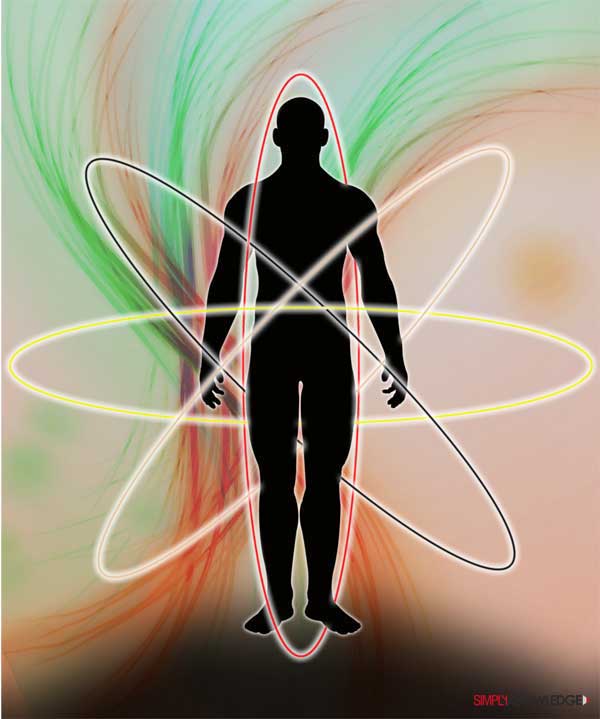
Hippocrates is credited for expounding the Humour theory. In context of Hippocratic medicine, the term ‘Humour’ refers to body fluids. Hippocrates suggested that four primary humours- black bile, yellow bile, blood and phlegm were responsible for the mental or psychological temperament of all humans. These humours characterized psychological temperaments- melancholic, sanguine, choleric and phlegmatic. Some of these phrases are used till date, though the theory has been proved wrong.
Mystery surrounds how Hippocrates developed the Humours theory. Some historians claim, he learnt it in the Orient, when travelling as a teenager, with his father. Others believe he developed it indigenously, after dissecting a human cadaver and observing animal carcasses from which various coloured body fluids flowed.

Hippocrates attributed each humour to a season, since environmental changes, he believed, impact human moods and behaviour resulting in physical ailments. Hence, medical practitioners relying upon the Humours theory, believed that to understand any sickness, it was essential to learn about the patient’s temperament as well as body fluids and the victim’s description of symptoms- vital to learn about their mental state, family relationships and understanding of the disease. Humours therapy also consisted of physicians gaining knowledge about a patient’s lifestyle, adaptability to climatic changes and other psychological factors. The theory, after much debate and experimentation was however discarded in the 20th century.
Hippocrates is also credited to some extent with the dress code followed by physicians worldwide till date: In one of his writings, Hippocrates stipulated that any medical practitioner should be well groomed and always exuding confidence that would comfort the patient. Further, he extolled that patients, at all times, should be clean and presentable to others, which would help alter their mental state and hence, help healing the disease.
Some psychologists nowadays also acknowledge that Hippocratic findings about Humours could have been proved to some extent, if he had recourse to modern technology, since human behaviour is largely influenced by their physical health- which, to some degree, may depend upon a proper balance of body fluids.

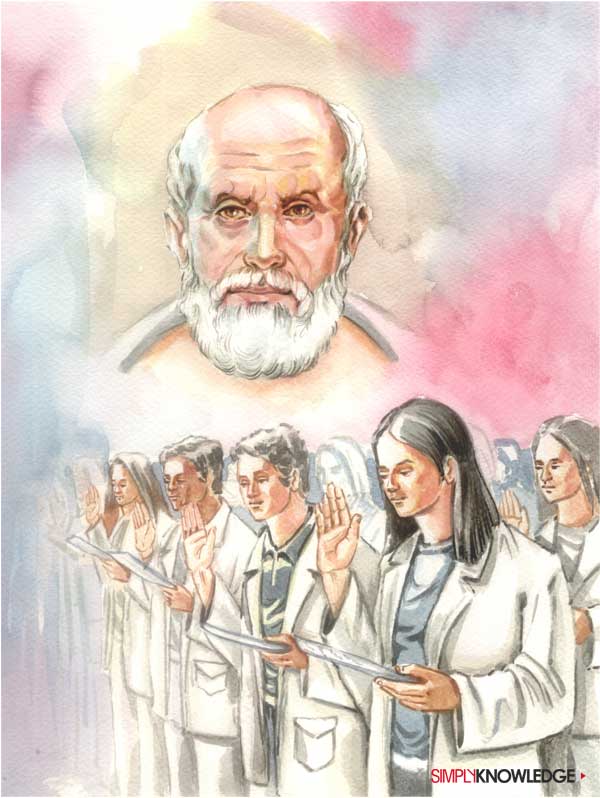
Hippocrates is best remembered for authoring the Hippocratic Oath- a pledge taken by all medical graduates entering active practice.
The Hippocratic Oath states: “I swear by Apollo, the healer,Asclepius, Hygieia, and Panacea, and I take to witness all the gods, all the goddesses, to keep according to my ability and my judgment, the following Oath and agreement: To consider dear to me, as my parents, him who taught me this art; to live in common with him and, if necessary, to share my goods with him; To look upon his children as my own brothers, to teach them this art; and that by my teaching, I will impart a knowledge of this art to my own sons, and to my teacher's sons, and to disciples bound by an indenture and oath according to the medical laws, and no others. I will prescribe regimens for the good of my patients according to my ability and my judgment and never do harm to anyone. I will give no deadly medicine to any one if asked, nor suggest any such counsel; and similarly I will not give a woman, pessaries (intra-uterine medicinal inserts) to cause an abortion. But I will preserve the purity of my life and my arts.
I will not cut for stone even for patients in whom the disease is manifest; I will leave this operation to be performed by practitioners, specialists in this art. In every house where I come I will enter only for the good of my patients, keeping myself far from all intentional ill-doing and all seduction and especially from the pleasures of love with women or men, be they free or slaves. All that may come to my knowledge in the exercise of my profession or in daily commerce with men, which ought not to be spread abroad, I will keep secret and will never reveal.
If I keep this oath faithfully, may I enjoy my life and practice my art, respected by all humanity and in all times; but if I swerve from it or violate it, may the reverse be my life.”

Hippocrates was perhaps unaware of the fact while authoring this oath that it embodies Altruism- a psychological concept that finds mention in all spiritual texts of the world. Altruism is a characteristic that encourages individuals to make sacrifices- either in cash and material, or, if required, their own lives- for the benefit of the mankind.
The Hippocratic Oath also speaks of physicians maintaining confidentiality about the physical and mental condition of their patients- a quality required by all modern day psychologists and psychological counsellors working in a variety of environments, from primary schools to war zones, prisons to ultra-tech offices.
Further, the Hippocratic Oath abhors the concept of abortion, which has been a topic of hot debate among leaders of various religions on grounds; it amounts to murder, since a foetus is considered as a child in the primordial stages of development. In most cases, women undergoing abortion, out of choice or due to medical emergency, are mentally scarred and require psychological counselling. Hippocrates was perhaps aware of this psychological trauma and hence, asks physicians to desist from administering or giving away medications that can terminate pregnancies.
Next Biography








